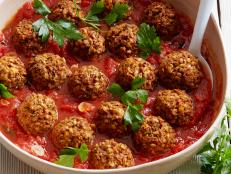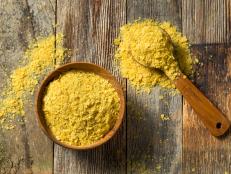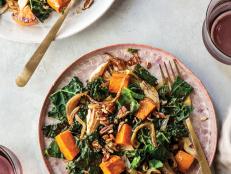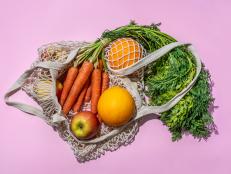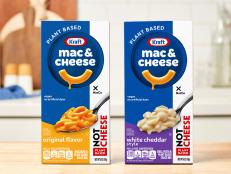Simple Recipes for Joy: Chatting with Jivamukti's Sharon Gannon

In 1984, Sharon Gannon — along with David Life — founded Jivamukti Yoga. This soulful, pioneering method, which helped spawn yoga's ascension in the Western world, encompasses more than vigorous Vinyasa movements: It also fosters compassion. In her new book, Simple Recipes for Joy: More Than 200 Delicious Vegan Recipes (Avery Books), Gannon delineates this ethos by putting the spotlight on organic dishes from her popular New York cafe, Jivamuktea. Additionally, she sheds light on the oft-deemed-mysterious components of veganism, and offers up menu ideas. Here, she discusses why meat-and-dairy-free living translates to easily discovered happiness.
It is the first vegan cookbook written by a well-known yoga teacher, and I actually wrote the book myself and came up with the recipes. I have presented all of the aspects of vegan cooking from a more inclusive spiritual point of view — how what you choose to eat can be a spiritual practice, karmically affecting not only your physical health, but also the health and happiness of your eternal soul as well as other souls, and the future health and happiness of planet Earth, and how that larger politic is connected through our karmas. The title of the book, Simple Recipes for Joy, has a double meaning: simple as in easy, quick, not complicated; most of the recipes are so simple a child can prepare them. But also simple as in direct: veganism being the most-direct way to increase joy in your own life, in the lives of others and the planet.
Oh my, you've asked me the billion-dollar question that has spurred my life’s passion.
Yoga teaches that whatever you want in life you can have, if you provide it for others first. In fact, whatever you are experiencing in life has come from how you have treated others in your past. If you want to ensure a happier reality for yourself and others, then treat others as you would like to be treated. Yes, the message is an old one, but could never be more relevant. Ahimsa, which means nonviolence, is not a new concept. In fact, it forms the foundation for all spiritual traditions and most all religions in the world today. But extending ahimsa to include other animals and the Earth, that’s a radical new concept. Veganism is the most simple and direct way to reduce violence and create more joy in our own lives [and] in the lives of others, including other animals, and in the world.
Certainly there was yoga being taught in New York City then, and during that time we sought out and studied with any teacher we could find. But at the end of the day no one was teaching yoga as spiritual activism. Asana practice was looked down upon as merely physical, not spiritual. So when we had the opportunity to teach, we naturally shared the aspects of yoga that turned us on personally — which meant teaching asana as a spiritual practice, as a method to resolve relationships with others. We also included meditation, sacred music, Sanskrit study, devotion to God, veganism, animal rights and political activism.
I am so happy about it, and it makes me feel hopeful.
An increase in self-confidence. Many people are choosing to think for themselves and not let the meat and dairy industries determine their food choices. Slick advertising campaigns have hypnotized us into thinking that we have to eat food that makes us dull, fat, unhealthy and sick. But today, more and more professional chefs as well as everyday people are realizing that they have the power to make this world a better place — a more kind and compassionate place — through preparing food which does not involve violence and does not contribute to the devastation of our planet. The fork can be a weapon of mass destruction or an implement for peace. Peaceful eating does not have to mean bland. Good food should also taste good. No matter how good for you someone tells you a certain food or dish might be, if it doesn't taste good your dining experience is not going to be exciting. Whatever we do, including eating, should increase our happiness, or why do it? Cooking can be approached as an adventure — utilizing simple alchemical skills — gathering the best ingredients and adding the right amount of herbs and spices to tantalize the palate and make you and everyone else feel good.
Quick Noodle Soup. It takes about 10 minutes to make, and I can't think of anything more satisfying than noodles in a warm, savory broth.
I've organized the soup chapter into six sub-categories: Blended, Creamy, Chunky, Noodle, Broth and Raw — so there are lots. But on a cold, rainy night I might choose Spicy Red-Pepper-Lentil Soup, combining roasted sweet red pepper with jalapeno and curry powder, or New England "Clam" Chowder, vegan style. The chewy texture of shiitake and oyster mushrooms combined with just the right amount of dried kelp to give it a sea-salty taste will fool any New England fisherman.

GREG SORENSON, Derek Goodwin Photography
Let the millet sit uncovered after cooking for about 10 minutes so it dries out some, then transfer it to a large bowl. Add the flaxseed oil and, using a large fork, mix well to coat the millet. Little by little, add the spirulina, using the fork to mix. Add the soy sauce, mixing well until the millet is bright green.
Reprinted from Simple Recipes of Joy by arrangement with Avery Books, a member of Penguin Group (USA) LLC, A Penguin Random House Company. Copyright © 2014, Sharon Gannon.
Alia Akkam is a New York-based writer who covers the intersection of food, drink, travel and design. She launched her career by opening boxes of Jamie Oliver books as a Food Network intern.

























